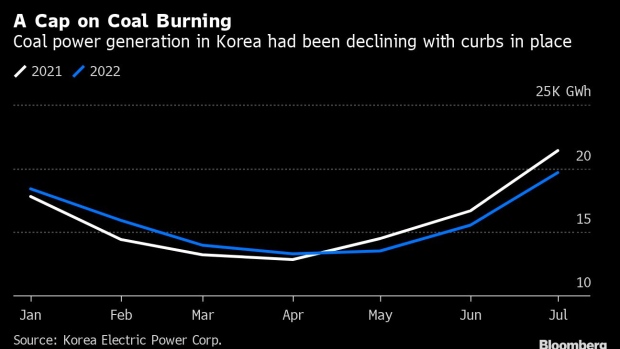Sep 21, 2022
Sky-High Gas Prices Prompt Korean Utilities to Burn More Coal
, Bloomberg News

(Bloomberg) -- South Korean utilities straining under the pressure of pricey gas are turning to cheaper coal to meet surging electricity demand during a power crunch.
Companies haven’t been curbing coal power generation since July, ignoring voluntary limits put in place by the government last year, according to people familiar with the matter, who asked not to be identified because the information isn’t public.
Coal power is seeing a global resurgence because of the energy crisis in the wake of Russia’s invasion of Ukraine. As prices for liquefied natural gas soar and competition heats up for supplies of the chilled fuel, coal is looking more attractive to nations like South Korea, the third-largest importer of LNG. The country is also pushing a shift toward nuclear energy.
“Ramping up coal and nuclear power is an obvious option for the government,” said Kim Namyll, a senior researcher at the Korea Energy Economics Institute. “Looking for alternative energy sources that are cheaper than gas should be considered by the government given the massive cost pressure” on utilities.
South Korea has been trying to reduce its coal consumption as part of its decarbonization plan, which led former President Moon Jae-in to permanently shut at least 10 plants since 2017. Under a program that began in 2019, state-run power generators must curb coal use in the winter months from December to March. Voluntary reduction during the remaining months began last year.
Korea Electric Power Corp., which is grappling with record losses on the back of surging energy costs, has requested that the voluntary cap be eased. The request was one of the proposals to improve Kepco’s finances in a plan submitted to the government, according to an internal document seen by Bloomberg. While the limit is voluntary, companies are still expected to curb their use of coal.
A spokesman for Kepco declined to comment.
One of the people said the government is looking into the matter because high energy prices are becoming too heavy a burden on Kepco and Korea Gas Corp. The person said the mandatory limits during the winter months are likely to be eased.
Between December 2020 and February 2021, as many as 46 coal plants were subject to the mandatory curbs, with operation halting at 17 facilities during the period.
The Asian nation hasn’t yet made a decision on whether to burn more coal as it’s weighing various options to offer a stable supply of electricity this winter, according to an official from the energy ministry, who asked not to be identified due to internal policy.
The global scramble for adequate power supply ahead of the peak winter season is likely to keep gas prices elevated. The Japan-Korea Marker, North Asia’s LNG benchmark, has about doubled this year following disruptions from the war in Ukraine. A weakening Korean won, one of the worst-hit currencies in Asia, has further added to the cost pressure on the state energy firms that need to pay in dollars when importing fuels.
Meanwhile, coal prices in Asia, while still much cheaper than gas, surged to a record earlier this month. Any move by South Korea to burn more coal threatens to send prices higher.
©2022 Bloomberg L.P.






